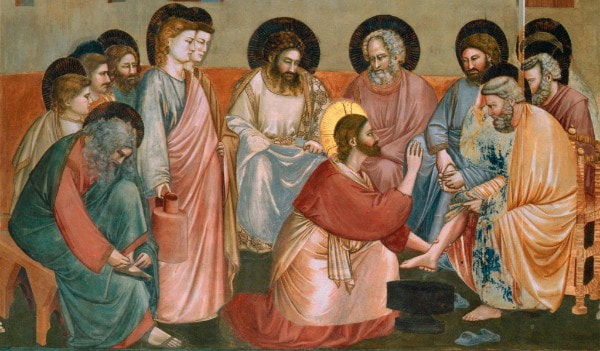|
Christ Washing the Disciples' Feet, fresco by Giotto c. 1305, via WikiArt.org Maundy Thursday
April 13, 2017 Just for the fun of it we’ll begin with a little Latin. The liturgical name for today is taken from the first antiphon of the ceremony of the washing of the feet, “mandatum novum,” John 13:34. It is obvious from where the English words “mandate” and “command” derive. We find in the scriptures appointed for this day three mandates. In Exodus, concerning the Passover, the Israelites are told “You shall keep it as a feast to the Lord.” In I Corinthians, Paul, recounting the events of the meal on the night Jesus was betrayed, passes on Jesus’ words, “Do this in remembrance of me.” Then in John’s Gospel we hear from Jesus directly a new commandment following his washing of the disciple’s feet, “Love one another; even as I have loved you, that you also love one another.” There are no “may” rubrics here that give permission to opt out – declarative statements all around. All of the events referenced, the Passover, the Lord’s Supper and the Foot Washing, are living sermons. Each one is about love; God’s active love for us and our love for each other which is a way of loving God. These great expressions of love are portrayed in the simple yet intimate acts of feeding and washing. Is it not in moments of such service, diakonia, when we often are able to show our love in the offering of oneself to another? Paul is saying there cannot even be a Eucharist in a community whose members do not love one another. I think immediately of when my children were small and the delight, usually, of the high chair ceremony. This was high church. We got our positions, the vested bib was in place, and a jar of food was warmed in the special bowl for this mealtime alone, adorned with the family children’s spoon. Tradition is important. In this case the washing followed the eating, but bath time was also a highly ritualized event. I am reminded too of such moments on the other end of life. Times when my parents were ill and dying and once again vested in bibs and gowns, feeding and washing, intimate moments of connection through the love of eye contact and being close in deeply held thanksgiving that did not need words. The gratitude was thick in the air and it went both ways. Lots of remembering occurred. One could argue that it was all sacramental in that each tender moment was an expression of the love that goes beyond oneself and is directed toward another. Jesus’ death and resurrection, and the ways in which we remember him and one another, hold this entire cycle of life from birth to death. It gives life to all, the giver and the receiver, and transforms the relationship. A bond is forged that is indelible, never to be forgotten, and in such moments not a single morsel is lost because there time has no meaning. Eternal life is made present. It is the sacrament of the moment. It is cosmic. So it is with the pattern of the life of faith. Such acts of Gospel love epitomize the paradox of the Gospel where at a table or wash basin the offerings of hospitality usually attributed to a common servant become revolutionary. The three days initiated today, in their unity, invite us to this revolution of love. Bishop Skip Comments are closed.
|
Bishop Skip AdamsThe Right Reverend Gladstone B. Adams III was elected and invested as our Bishop on September 10, 2016. Read more about him here. Archives
December 2019
Categories |
Copyright © 2024 The Diocese of South Carolina
P.O. Box 20485, Charleston, SC 29413 - 843.259.2016 - [email protected]
P.O. Box 20485, Charleston, SC 29413 - 843.259.2016 - [email protected]


 RSS Feed
RSS Feed